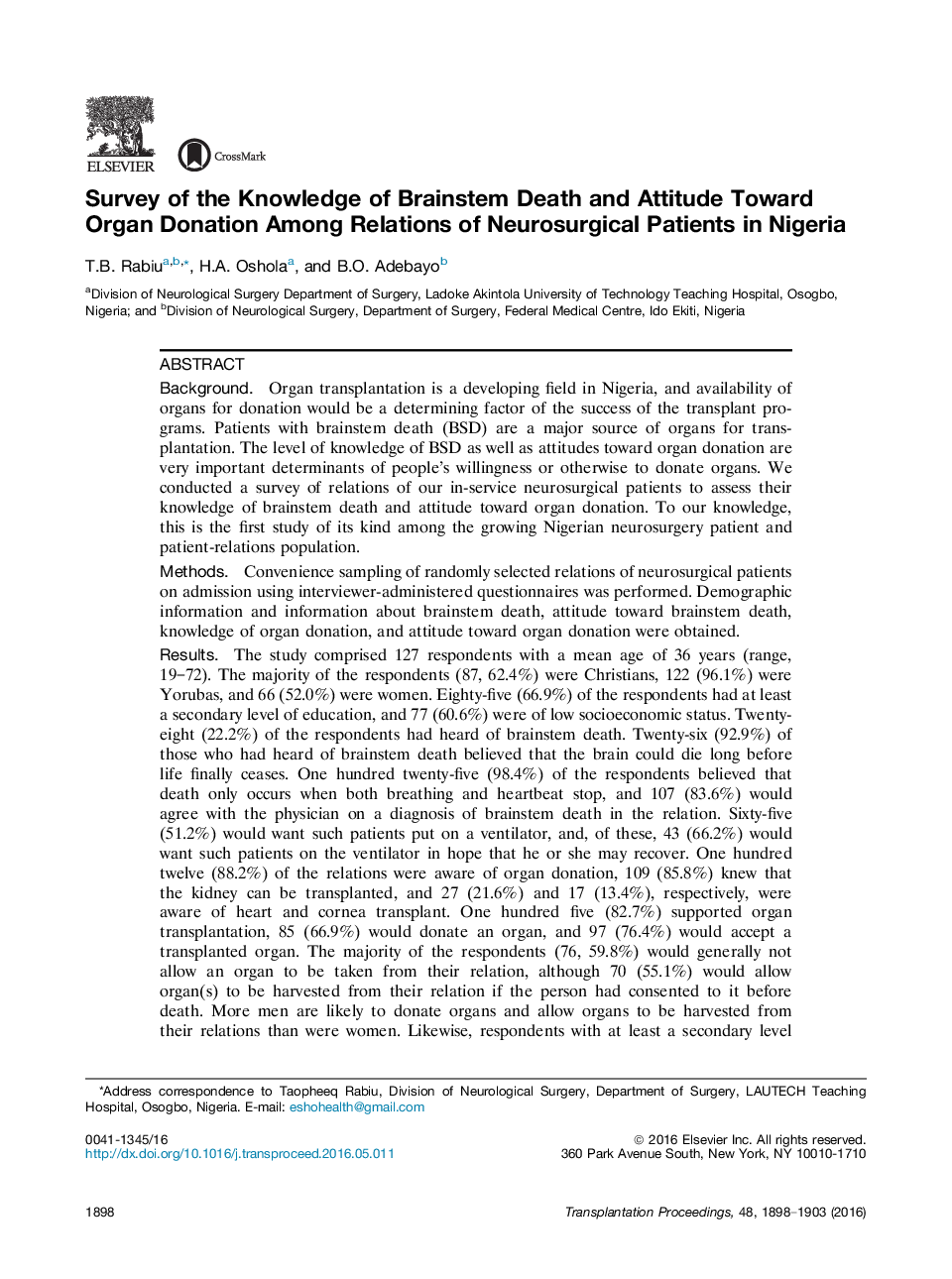| Article ID | Journal | Published Year | Pages | File Type |
|---|---|---|---|---|
| 5729118 | Transplantation Proceedings | 2016 | 6 Pages |
â¢One hundred twenty-seven respondents with mean age of 36 years (range, 19-72) were studied.â¢Respondents had a low level of awareness (22.2%) of brainstem death.â¢Respondents had a high level of awareness (88.2%) of organ donation.â¢Respondents had a high level of support (82.7%) for organ transplantation.â¢Respondents had a high level of willingness (66.9%) to donate organ(s).
BackgroundOrgan transplantation is a developing field in Nigeria, and availability of organs for donation would be a determining factor of the success of the transplant programs. Patients with brainstem death (BSD) are a major source of organs for transplantation. The level of knowledge of BSD as well as attitudes toward organ donation are very important determinants of people's willingness or otherwise to donate organs. We conducted a survey of relations of our in-service neurosurgical patients to assess their knowledge of brainstem death and attitude toward organ donation. To our knowledge, this is the first study of its kind among the growing Nigerian neurosurgery patient and patient-relations population.MethodsConvenience sampling of randomly selected relations of neurosurgical patients on admission using interviewer-administered questionnaires was performed. Demographic information and information about brainstem death, attitude toward brainstem death, knowledge of organ donation, and attitude toward organ donation were obtained.ResultsThe study comprised 127 respondents with a mean age of 36 years (range, 19-72). The majority of the respondents (87, 62.4%) were Christians, 122 (96.1%) were Yorubas, and 66 (52.0%) were women. Eighty-five (66.9%) of the respondents had at least a secondary level of education, and 77 (60.6%) were of low socioeconomic status. Twenty-eight (22.2%) of the respondents had heard of brainstem death. Twenty-six (92.9%) of those who had heard of brainstem death believed that the brain could die long before life finally ceases. One hundred twenty-five (98.4%) of the respondents believed that death only occurs when both breathing and heartbeat stop, and 107 (83.6%) would agree with the physician on a diagnosis of brainstem death in the relation. Sixty-five (51.2%) would want such patients put on a ventilator, and, of these, 43 (66.2%) would want such patients on the ventilator in hope that he or she may recover. One hundred twelve (88.2%) of the relations were aware of organ donation, 109 (85.8%) knew that the kidney can be transplanted, and 27 (21.6%) and 17 (13.4%), respectively, were aware of heart and cornea transplant. One hundred five (82.7%) supported organ transplantation, 85 (66.9%) would donate an organ, and 97 (76.4%) would accept a transplanted organ. The majority of the respondents (76, 59.8%) would generally not allow an organ to be taken from their relation, although 70 (55.1%) would allow organ(s) to be harvested from their relation if the person had consented to it before death. More men are likely to donate organs and allow organs to be harvested from their relations than were women. Likewise, respondents with at least a secondary level of education had better awareness of brainstem death and were more likely to donate organs and allow organs to be harvested from their relations than were their less-educated counterparts.ConclusionsThe knowledge of brainstem death was low among respondents, although most of them would agree with the physician if such diagnosis was made for their relation. Most of the respondents were aware of organ donation and supported it, but the majority would not allow an organ to be harvested from their relations. Hence, education of the Nigerian people about brainstem death and organ donation is essential to increase the pool of available organs for transplantation in our community.
